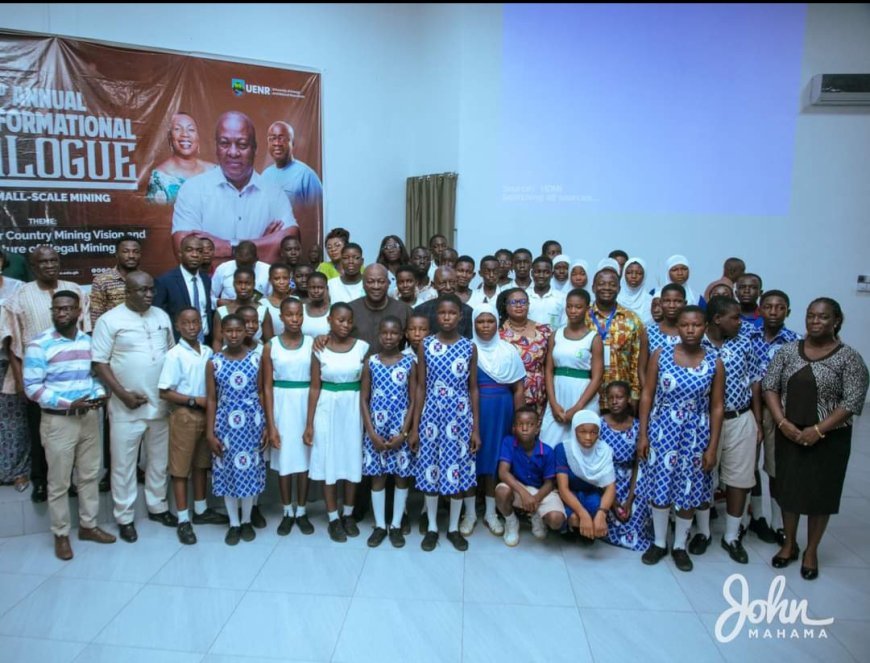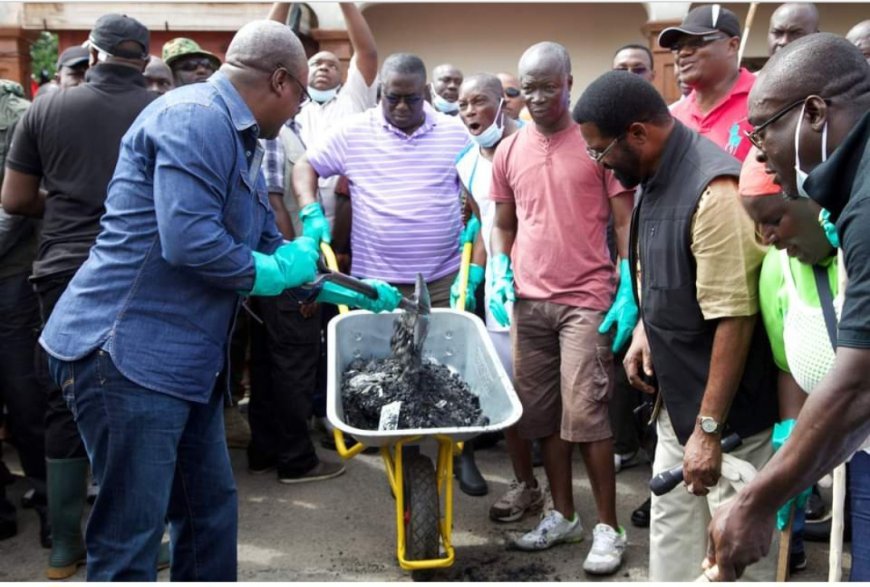John Mahama's Reset Ghana Agenda

The former President John Dramani Mahama and the flagbearer of the National Democrate Congress has unveiled his ambitious "Reset Ghana Agenda." This comprehensive plan is designed to address the nation's pressing challenges and set the country on a path toward sustainable development, economic recovery, and social equity.

The Reset Ghana Agenda encompasses a wide range of policies and initiatives aimed at revitalizing the economy, creating jobs, improving public services, and enhancing governance. Here, we explore the key components of this agenda and its potential impact on Ghana's future.
Economic Revitalization and Job Creation

At the heart of the Reset Ghana Agenda is the goal of reviving the economy and creating sustainable jobs. Mahama’s plan includes several strategies to achieve this:
- Industrialization and Manufacturing: The agenda emphasizes the development of the manufacturing sector to reduce dependency on imports and boost local production. This includes incentives for businesses to set up manufacturing plants and support for small and medium-sized enterprises (SMEs).
- Agricultural Transformation: Recognizing the importance of agriculture in Ghana's economy, the agenda proposes modernizing the sector through mechanization, improved irrigation systems, and support for farmers to enhance productivity and food security.
- Infrastructure Development: Significant investment in infrastructure, including roads, bridges, and energy, is a key component. Improved infrastructure is expected to facilitate business operations, attract investment, and create jobs.
- Youth Employment Programs: Special focus is given to addressing youth unemployment through vocational training, entrepreneurship support, and apprenticeship programs. The National Apprenticeship Program aims to equip young Ghanaians with the skills needed for various trades and industries.
- 24-Hour Economy: Mahama's vision for a 24-hour economy seeks to maximize productivity by leveraging public-private partnerships. This initiative includes tax incentives, stable and low-cost electricity during peak hours (night), enhanced security, and improved transportation to encourage round-the-clock economic activities.
- Completion of Ongoing Projects: Mahama has committed to completing all projects started by past governments, ensuring continuity and efficient use of resources.
- One Million Coders Programme: This initiative aims to train young Ghanaians in coding, programming, software development, graphic design, and other digital skills, positioning them for opportunities in the global digital economy.
Education and Healthcare Reforms

Mahama's Reset Ghana Agenda also places a strong emphasis on improving education and healthcare services to ensure a healthier and more educated population:
- Quality Education for All: The agenda includes plans to increase access to quality education at all levels, from primary to tertiary. This involves building more schools, improving teacher training, and providing adequate learning materials.
- Free Senior High School (FSHS) Improvement: Mahama has promised to enhance the implementation of the Free Senior High School policy and extend its benefits to include private schools, ensuring broader access to quality secondary education.
- Technical and Vocational Education and Training (TVET): Expanding TVET institutions and programs to align with market needs is a priority. This will ensure that students acquire practical skills that are directly applicable in the job market.
- Universal Healthcare: Mahama aims to enhance the National Health Insurance Scheme (NHIS) to provide comprehensive healthcare coverage for all Ghanaians. This includes upgrading healthcare facilities, ensuring the availability of essential medicines, and improving healthcare delivery systems.
- Access to Free Primary Healthcare: As a complement to the NHIS, Mahama promises to provide free primary healthcare to ensure that all Ghanaians have access to essential health services without financial barriers.
Governance and Anti-Corruption

Good governance and the fight against corruption are central to the Reset Ghana Agenda. Mahama's plan includes measures to promote transparency, accountability, and efficiency in government operations:
- Strengthening Institutions: The agenda proposes reforms to strengthen key institutions such as the judiciary, parliament, and anti-corruption agencies. This will enhance their independence and effectiveness in tackling corruption and enforcing the rule of law.
- Public Sector Reforms: Streamlining the public sector to eliminate waste and improve service delivery is a priority. This involves the use of technology to automate processes, reduce bureaucracy, and increase efficiency.
- Decentralization: Empowering local governments to make decisions and manage resources effectively is crucial for balanced regional development. The agenda includes measures to devolve more powers and resources to district and municipal assemblies.
- Constitution Review: Mahama has promised to continue the Constitution review process initiated by the late President, Prof. John Evans Atta-Mills, to address contemporary issues and improve governance.
- Ministerial Efficiency: To ensure efficient governance, Mahama has pledged to run a government with only 60 ministers, reducing the size of the cabinet and promoting cost-effective administration.
- Restoration of Funds: He plans to restore the sinking fund, heritage fund, and infrastructural investment fund to ensure sustainable financing for development projects.
- Elimination of Perks for Appointees: Mahama has vowed to scrap the payment of utility bills, DSTV, fuel, and other perks for government appointees, aiming to reduce government expenditure and ensure prudent use of public resources.
Social Inclusion and Equity

Ensuring that all Ghanaians benefit from economic growth and development is a key principle of the Reset Ghana Agenda:
- Support for Vulnerable Groups: The agenda includes targeted programs to support women, children, persons with disabilities, and the elderly. This involves providing social safety nets, access to education and healthcare, and economic opportunities.
- Women’s Development Bank: One of the standout initiatives is the establishment of a Women’s Development Bank to support women entrepreneurs and traders with interest-free loans. This bank will be positioned in districts and large market areas to ensure easy financial accessibility for women.
- Affordable Housing: Addressing the housing deficit through the construction of affordable housing units is a priority. This will provide decent living conditions for low- and middle-income families.
Environmental Sustainability

Mahama’s agenda also recognizes the importance of protecting the environment and promoting sustainable development:
- Renewable Energy: Promoting the use of renewable energy sources such as solar and wind to reduce reliance on fossil fuels and mitigate climate change.
- Waste Management: Implementing comprehensive waste management systems to keep cities clean and reduce pollution.
- Conservation Initiatives: Protecting natural resources and biodiversity through conservation programs and sustainable land management practices.
Conclusion
John Mahama's Reset Ghana Agenda is a bold and comprehensive plan aimed at transforming Ghana's socio-economic landscape. By focusing on economic revitalization, education and healthcare reforms, good governance, social inclusion, and environmental sustainability, the agenda seeks to address the root causes of Ghana's challenges and create a prosperous and equitable society. As the 2024 elections approach, Ghanaians will closely watch how these proposals resonate with their aspirations and needs, and how effectively they can be implemented to bring about the desired change.







